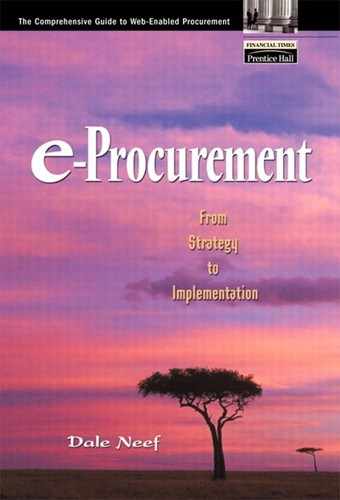The Changing Role of Procurement Specialists
One key area of change is that of the traditional purchasing role and the changes to traditional centralized versus decentralized purchasing strategies. They may essentially become one, at least for MRO, except for a small number of overseeing procurement specialists. This elimination of labor and reduction in cycle time can and will be enormous in terms of savings.
One thing that is certain is that the role of the purchasing professional will change dramatically over the next few years (see Figure 4.1). There is a good deal of speculation as to what this role might become. Certainly, any position that currently deals with paper-based transactions will be gone, and depending on how extensively a company pursues a strategy of buying via the impersonal e-markets and third-party trading hubs, the role of relationship manager will change dramatically. If a policy of close vendor ties for mission-critical direct materials continues, and strategic sourcing continues to be important, there will always be a role for specialists who understands the manufacturing process and the comparative merits of various material and substitutes.
Figure 4.1. The changing role of procurement specialists.

There will also be a need for purchasing officers with good client management skills to focus not only externally on the buyer-seller relationship (contract management and strategic sourcing), but also internally, within their own firms, to ensure communication and purchasing policy effectiveness throughout the organization. Similarly, there is likely to be a need for specialists who can help develop and continuously update the rules that govern the relationships between suppliers and their companies. Someone—often a person these days known as a super user—will need to master the sophisticated decision-support tools that are becoming available in order to advise and help set the buying criteria themselves. To these we can also safely add roles for employees working on catalog management and, whatever the potential of a self-governing “self-service” procurement system, someone working on managing, or at least overseeing, compliance.
Strategic team-based purchasing is the one approach that has developed in the past several years that promises to be enhanced by this shift toward online procurement, because the rationalization of the purchasing process that takes place during an e-procurement initiative tends to help purchasing specialists to view the process by which they acquire direct materials, particularly, as much more horizontal and seamless. The certainty of monitoring compliance that comes from the e-procurement systems also means that procurement specialists in different departments now view purchasing as a corporate rather than a unit function.
